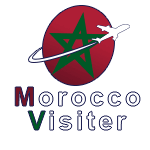Money in Morocco
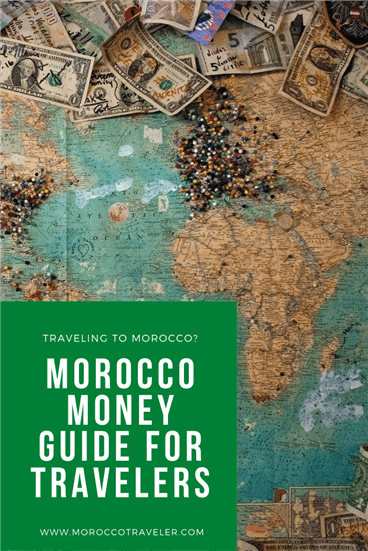
Moroccan Dirhams (Dhs or MAD) are the official Moroccan currency. They come in banknotes of four denominations (20 Dhs, 50 Dhs, 100 Dhs, and 200 Dhs) and coins of six denominations (10 centimes, 20 centimes, 1/2 dirham (half a dirham), 1 Dirham, 2 Dhs, 5 Dhs, and 10 Dhs). As a traveler, I advise you to use only 1 dirham and up, don’t bother paying the exact amount. When Moroccans are asked to pay 49.97 dirhams, they simply pay them 50 dirhams. It’s faster, and you avoid a lot of change in your pocket.
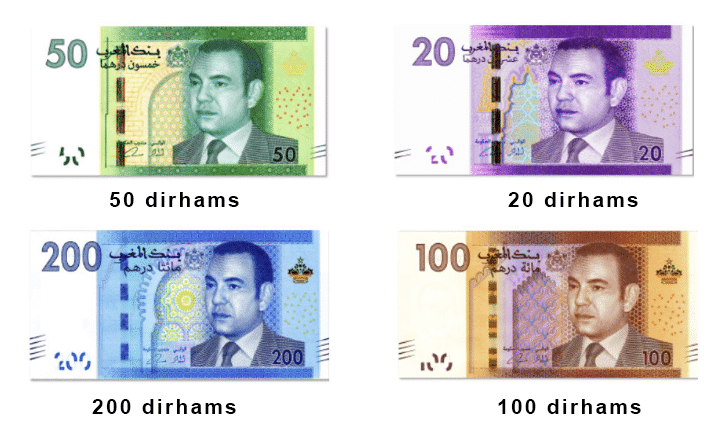
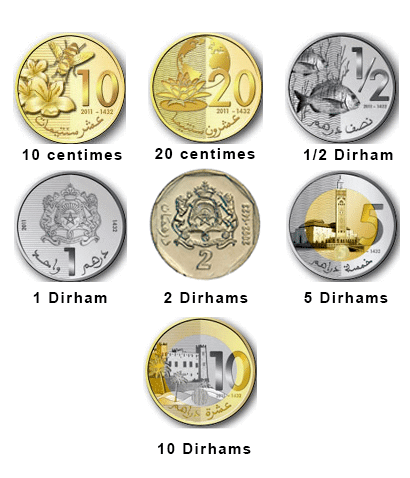
It’s hard to pay for cheap items or services with large notes, so you always need to keep enough small notes and coins. Using 100 Dirhams note for a 7 Dirhams bill is not a good idea.
Table of Contents
Conversion rate into Moroccan dirhams
1 US Dollar is approximately equal to 9.5 Moroccan Dirhams. If you are not using the US Dollars, you can use Google to get an idea about the exchange rate from your currency. Go to Google’s search bar and type “1 (your currency here) to MAD,”. i.e., 1 euro to mad.
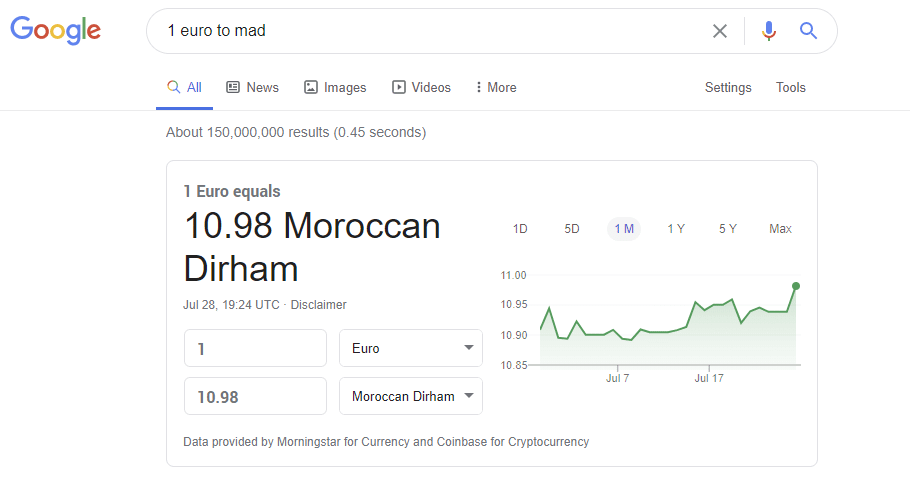
Note: If you are inside the country, people will call it simply “Dirhams”, but this same currency name is used for other countries like United Arab Emirates Dirham, so be careful when using a converter.
How to obtain Moroccan currency?
You are not allowed to bring Moroccan currency into the country, it is mainly aimed at business travelers, but it also applies to tourists. However, if you still have some spare change or banknotes from your last visit to Morocco, you can take these with you. Also, you can’t take Moroccan currency out of the country, so consider this.
Obtaining Moroccan Dirhams is quite simple:
- Using the exchange bureaus at all Moroccan airports, also available in every major city
- Using credit cards (Visa and Mastercard) is the most reliable method of withdrawing money in Morocco.
- Using banks is available everywhere, but they don’t accept all currencies.
Currency exchange bureaus are the best to change small amounts of money and don’t have credit cards, and sometimes there are additional exchange fees, so you may want to ask about that. You should always keep the receipt after exchanging money in a currency bureau; since you can’t take Moroccan cash out of the country, you’ll need the exchange receipts to change your leftover at the airport.
Also, if you’re using old versions or broken down bills, they may get refused. So make sure that you have the newest and cleanest banknotes when exchanging your national currency.
Credit cards can be used at any ATM in the country, and they are also available in some large shops, restaurants, hotels, and of course, all online payments for bookings. Make sure to give your bank a heads up before traveling to Morocco; they might limit or block your credit card if you use it outside of the country as a security measure, which could be extremely frustrating. Keep in mind that ATM’s maximum withdrawal amount is 2000 Dhs ($200). If you need a more considerable amount, you could either make several transactions or use different ATMs from different banks.
Generally, when using an ATM in Morocco, you’ll need a four-digit PIN code, so most cards with chip and pin technology are widely accepted. However, to use an American magnetic stripe card that doesn’t usually require a PIN code, you’ll have to get one issued by your bank before you travel.
Banks could also be used to get Moroccan Dirhams; they are available pretty much everywhere, but not all of them accept all currencies, and some of them don’t offer the service in the first place, and since they are used by locals too, you may be waiting for a long time.
Tips to avoid extra fees
- Withdraw large amounts less often: when you withdraw money from ATMs, you are always paying fees to your home bank, the local bank, or both of them. So even if you only need 200 Dhs ($20) at that moment, you may want to withdraw the maximum amount if you know you’ll be using it later.
- Always pay in cash in local currency: always say no when someone is offering you the opportunity to pay in your home currency; stores, restaurants, and ATMs will often provide this and present it as a service, but unfortunately, they don’t use the mid-market rate that you find on Google, they always want to make a profit, so they decide the exchange rate for you and keep the difference. Paying with the local currency with cash is almost always cheaper because you avoid the high fees and low exchange rates.
- Avoid ATMs & currency exchange bureaus in tourist locations: Don’t assume all the fees and the exchange rates are the same in all. Often the worst deals are to be found in areas with a captive audience, mostly tourists. You always want to use ATMs near a bank branch and currency exchange bureaus in random places, and definitely avoid them in or near airports, hotels, tourist places, pubs, and nightclubs.
How much money to take to Morocco?
This is pretty subjective, I can’t give you a clear answer but I can help you figure out the minimum amount of money that you’ll need during your trip to Morocco.
- Accommodation costs on average $50 per night, and it varies depending on the season and the location. If you’re a solo traveler, you should expect around $13 per night. However, to stay in a 3-star hotel or a riad, count on spending closer to a minimum of $100 per night.
- Breakfast is often included in many hotels and riads, but if not you can have a decent breakfast for about $2.
- Water is free but I don’t recommend it, bottled water is your best friend, $1.5 per person should be enough for one day.
- Lunch and dinner can cost anywhere from $2.5 to $10, the taste and quality vary almost as dramatically as the prices on offer.
- You don’t spend a lot on transportation, but on average you should expect $10 for Taxis, subways, etc.
So if you’re visiting Morocco on a budget, you should expect a minimum of $30 per day, but if money is not an issue for you, then we’re talking about $200 per day.
Now that we established the essential expenses, let’s move to luxuries:
- Pot of mint tea $0.5 – $2, in several riads it’s free.
- A cup of coffee is around $1.
- Car rental starts at around $25 and the price of one liter of petrol is $1, and if you like to explore the coast on a bicycle expect $9 or more.
- Buses between cities $7.
- Entry tickets go from $1 to $5.
- The cooking class experience starts at $40.
- Hammam experience with locals worth only $2, but to experience a more tourist-focussed luxury Hamam experience from $20 to $60 if massage is included.
- Camping in the Sahara Desert costs always a minimum of $100.
- Beer and cigarettes are also available even if Morocco is a strictly Islamic country, and it goes from $1 to $50 for beer and $1.5 to $3 for a pack of local cigarettes.
- Local snacks that you find in small shops or carts are very cheap and cost from $0.1 to $0.5
